This Lecturer Quit His Job to Become a ‘Plant Doctor’ & Help Farmers in Distress
Dr. Gowda also invented a unique innovative product in the form of Liquid Organic Plant Food that helps in growth of plants while also maintaining the quality of land known as Dr. Soil.
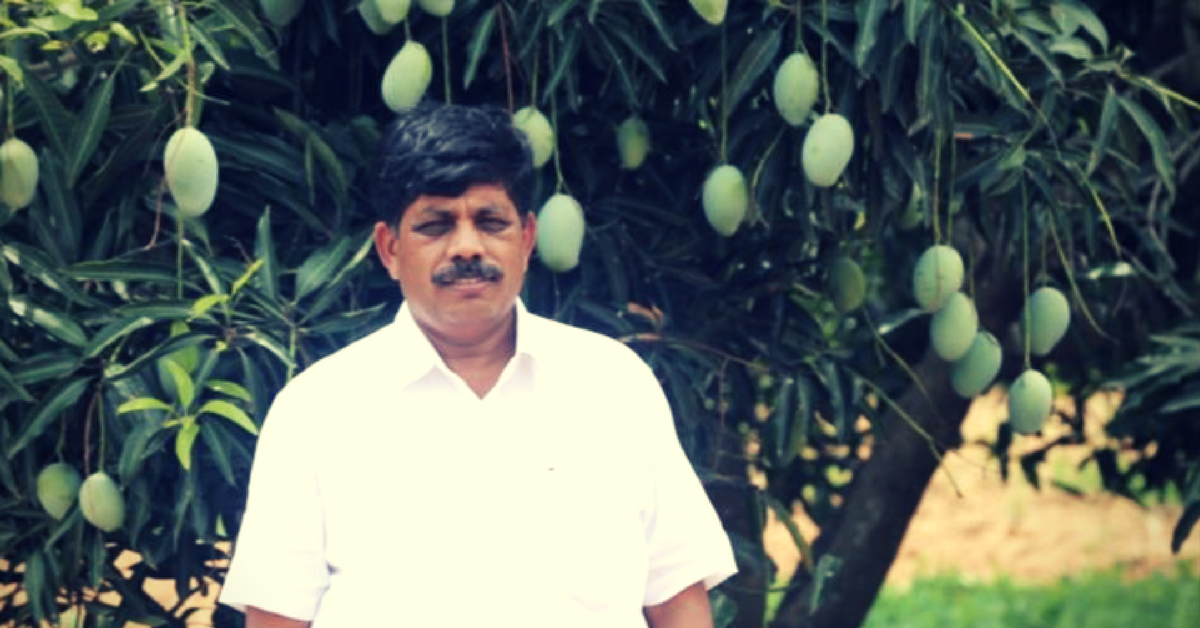
Dr. K R Hullunache Gowda, who was given an honorary doctorate by Jeeva Theological Open University, Chennai, for his work in farming, belongs to Srinivaspura village of Kolar district of Karnataka. Back in the 90s he finished his post-graduation in Sericulture and started his career as a lecturer in Chikaballapur University.
However,Dr. Gowda could see how Kolar, which was once famous for its mulberry, mango and vegetable plantation, was facing drought and shortage of rainfall year after year,resulting in huge losses for farmers.
The bore wells, the only source of irrigation,had all stopped working. The farmers had to shift from agriculture to some other sources of livelihood. Most of them started working as daily wage labourers and had to travel to Bangalore and nearby industrial areas every day for a living. He then decided to leave his job and find out the reasons behind the farmers’ problems and possible solutions.
Mulberry
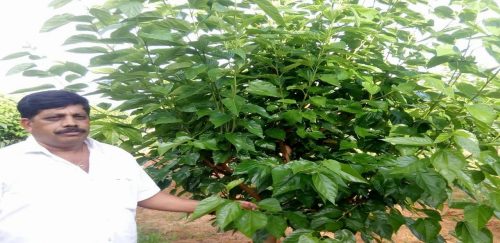
In 1995,Dr. Gowda planted mulberry in a row system usingthe traditional method that all farmers followed. In this method 5,000 small mulberry plants were grown per acre and only 250 DFLS could be reared. This required plenty of water and the labour cost was also very high to look after so many plants.
After years of research Gowda finally came up with a technique that solved all the problems of the mulberry farmers. He implemented dry land cultivation techniques for mulberry plantation.
In his mulberry tree plantation technique, per acre 430 mulberry trees can be grown and 300 DFLS (EGGS) can be reared. By this way the quality of leaves and cocoons became excellent. The cost of cultivation was also reduced to 50% compared to old methods.
By this method the farmers were able to grow mulberry with ease with minimum water usage. One family could maintain the farm without much labour and they were able to earn a living. This technique was recognized by Central Silk Board, and is implemented now in many parts of Karnataka state. Mulberry farmers from various districts of Karnataka and Andhra Pradesh visit mulberry farms that are under Dr. Gowda’s guidance.
You may also like – Ever Wondered How Much a Fair Price for an Indian Farmer’s Produce Should Be?
The technique has now been adopted by Government of Karnataka Sericulture department, which has given a target to all district sericulture departments to do mulberry tree plantation in 1,000 acres of land in their respective districts.
Mango Plantation
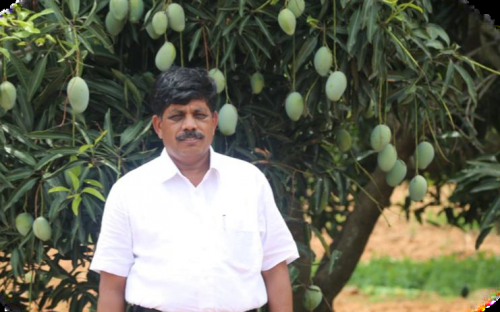
Dr. Gowda also started a mango plantation in 13 acres of his land back in 2000.He recognized that the decrease in quantity and quality of Kolar mangoes was due to the ‘Stem Borer disease’, which was a result of excessive chemical usage. He then researched for organic methods to tackle stem borer diseases in mango tree. Today under his guidance more than 500 acres of mango farms are grown organically and ripened naturally. These mangoes were of very good quality and the farmers were delighted to sell them at higher prices. Seeing the results, many mango growers are planning to grow there mangoes in a completely organic method.
Pomegranate
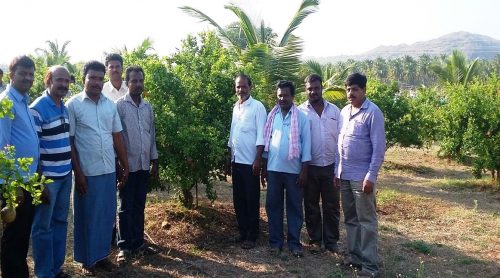
Bacterial Blight of pomegranate was first reported in India from Delhi in 1952 and was of minor economic importance till 1998. Presently, the disease occurs widely and outbreaks have been recorded in all major pomegranate growing states, including Karnataka, Maharashtra & Andhra Pradesh. Bacterial blight of pomegranate affects leaves, twigs and fruits.
The investments made by Pomegranate farmers are very high. If the farm gets affected by this deadly disease, the entire pomegranate farm is washed out and farmers suffer major loss.
Dr. Gowda wanted to get rid of this blight through organic methods. After years of research, he implemented the same in districts of Chitradurga and Davanagere. He noticed that these deadly diseases were being controlled through his methods. He not only witnessed recovery from blight, he also gave them a very good yield to earn premium prices. Moreover, the cultivation charges went down up to 50% and the maintenance of the field became much easier. This was a major achievement for K R Hullunache Gowda in pomegranate crop.
Similarly many organic techniques were invented by Dr. Gowda to tackle the common diseases in the crops like coffee, grapes, areca nut etc.
Dr. Soil
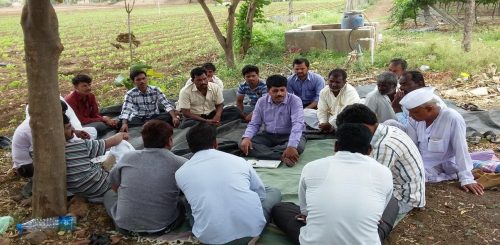
Dr. Gowda also invented a unique innovative product in the form of Liquid Organic Plant Food that helps in growth of plants while also maintaining the quality of land known as Dr. Soil.
By natural process of decomposition Dr.Soil balances the PH of land, reduces the acidic part and neutralizes the land. Once the land is neutralized the absorptions of carbon capacity is increased which reduces the carbon foot print, which results in carbon credit. This process is important to get natural crop in natural environment.
You may also like – Date Farming Changed This Vidarbha Farmer’s Life & He Can Help You Set up a Farm Too
The most important aspect of farming is biological Cycle (soil food web). But usage of chemical fertilizer, which produces sulphuric acid kills the earth worms and other microorganisms and destroy the entire biological cycle very badly.
According to Dr. Gowda use of Dr.Soil will create suitable environment and earth worms and biological cycle will be back naturally. So it will help to convert almost all physical nutrients matter into available form for plants.
“By natural decomposition method Dr.Soil produce required gases like Nitrogen, and Ammonia also. These are helpful for plant to grow and create distance between two particles of land which can help roots to grow and get proper oxygen. Hard soil automatically softens and water holding capacity increases,” says Dr. Gowda.
Villages adopted by Dr. Gowda
In the year 2010 Dr. Gowda started the Sasya Sanjeevini Grammen Abhivrudhi Trust and adopted savayava grama Venugopalapura from Kolar District and Chikkajajur village from Chitradurga District.
The trust plays a major role in the developmental activities of these villages. All the organic inputs in these villages are available at 50% cost, remaining 50% cost is borne by the trust. Farmers here are following organic techniques and the trust has appointed representatives to understand the various problems in the village and triesto give solutions for the same.
Mobile vehicle to spread awareness among farmers
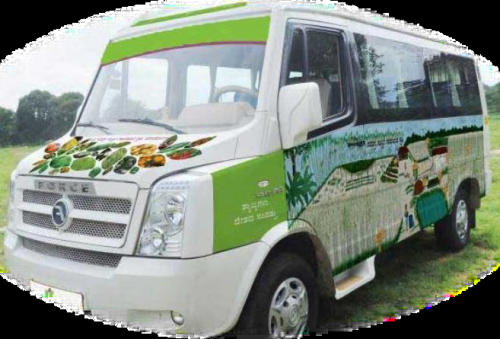
A mobile vehicle was launched to educate farmers from the trust. The vehicle travels to almost all parts of Karnataka to spread awareness. The mobile vehicle has a big-screen TV, speakers, pamphlets, organic books, newsletters and innovative videos to make farmers understand the need of organic farming.
Presently, the vehicle has covered more than 15 districts in Karnataka and has successfully reached the farmers, spreading awareness about organic farming
“Earlier days farmers were experts in their field, they knew exactly what they had to do. Over the years they have been misguided to use all sorts of fertilizers and chemicals, which in the long run have destroyed the soil and affected crop yields. Even the younger generation believes that they can cultivate only after using these deadly chemical fertilizers. It’s a major task to change their mindset to understand how these fertilizers have affected the earth,” says Dr. Gowda.
Dr. Gowda has spent all his life educating and training various farmers across the state. Thousands of farmers are happy continuing his organic techniques. He wants to continue his work in the same way so that one day the entire farmer community will adopt organic farming and stop conventional ways of farming. He proudly informs us how in his training sessions there are at least 15-20 software engineers who want to get back to farming.
“In just two decades the temperature has risen almost 15 degrees. We need to plant more trees, increase biodiversity. All agriculture land should have at least border trees. Wasteland should be converted to forests. Let us not blame anyone. Every individual should be the change,” he concludes
You can write to Dr. Gowda at [email protected] or call him on 8884677001 or 9740088770
Like this story? Or have something to share? Write to us: [email protected], or connect with us on Facebook and Twitter.
NEW: Click here to get positive news on WhatsApp!
This story made me
- 97
- 121
- 89
- 167
Tell Us More
We bring stories straight from the heart of India, to inspire millions and create a wave of impact. Our positive movement is growing bigger everyday, and we would love for you to join it.
Please contribute whatever you can, every little penny helps our team in bringing you more stories that support dreams and spread hope.



















